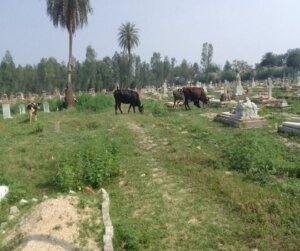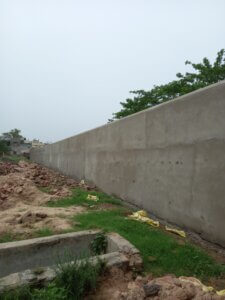BACSA has helped to support repair work to the boundary walls of Ambala’s Cantonment Cemetery. The association’s funding met the cost of repairs to the residential area and Army Road walls. Repairs to the front wall, which runs along the Jagadhiri Road and includes the main entrance to the site, were undertaken by Haryana municipal authorities. The walls have been improved and strengthened, as suggested by Mr Kapil Sharma, the supervising engineer engaged by BACSA. Mr William Crawley, the BACSA Area Representative, reports that ‘The site has been fully cleared of vegetation and graves which had been vandalised or otherwise damaged have been repaired’.
The repair work to the deteriorating boundary walls had been held up by a protracted ownership dispute, which, as the Hindustani Times reported, meant that ‘the cemetery could not be cleaned and was in a state of neglect; the place was covered with long wild grass, some spots inundated by sewer water, gamblers and drug addicts, with its historical importance forgotten’.
This situation was finally resolved in 2021, when the Punjab and Haryana High Court ruled that while ownership of the land vests with the Government of India, the British High Commission has occupancy rights, and the Ambala Cemetery Committee, run by Fr Patras Mundu (Secretary) and Fr Antony of the Holy Redeemer Church, is responsible for its upkeep and maintenance.
Dating from 1860, the cemetery covers 20 acres and holds around 20,000 graves, including 21 graves from the 2nd (1899-1902) Anglo-Boer War (3 soldiers, 18 prisoners of war), and 66 World War I graves maintained by the Commonwealth War Graves Commission.
The success of this project is largely due to the active engagement of the Ambala Cemetery Committee, which includes representatives of six local Christian communities, and is enthusiastically led by Frs Antony and Patras. They approached BACSA, the Deputy High Commission and local authorities to help in the task of protecting the Cemetery, and were scrupulous in regularly reporting progress to the sponsors. The Haryana authorities’ financial support is a rare, and welcome, initiative. The project is a fine example of the three-pronged approach (‘heritage, environment and communities’) which BACSA is keen to promote.


